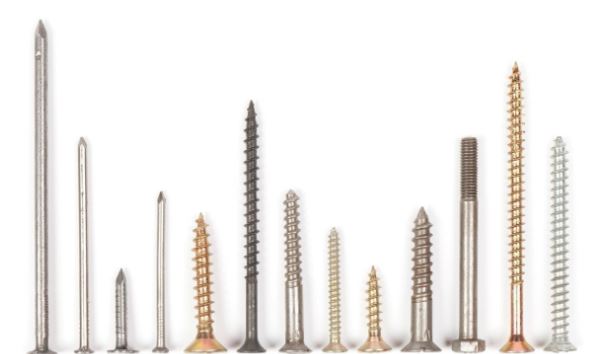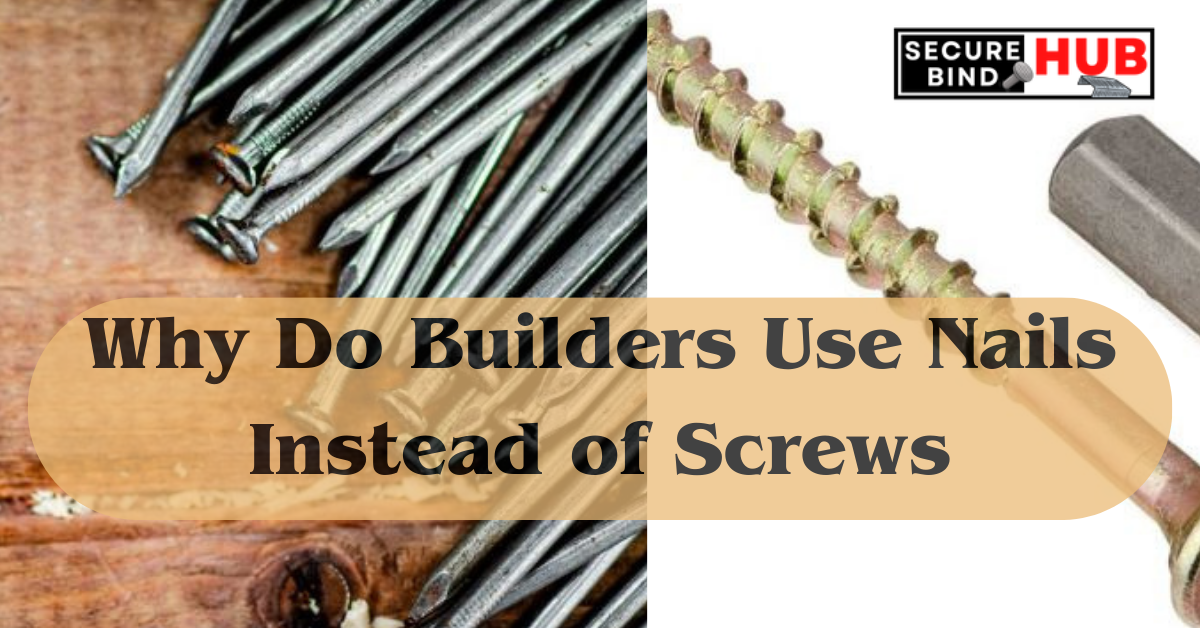The age-old argument between using nails and screws in construction and woodworking has been a subject of contention for millennia. Why builders use nails instead of screws, or vice versa, is a question that often perplexes those new to the craft. The decision between nails and screws is influenced by a number of factors, including the particular project needs, the materials being used, and the intended final result, even though both fasteners serve the basic purpose of putting things together.
In this investigation, we’ll look into the justification behind the decision to use nails rather than screws in several construction-related situations. Understanding this decision is essential to mastering the art and science of creating long-lasting buildings.
Why Do Builders Use Nails Instead of Screws

For a variety of reasons, all of which are influenced by the particular requirements of building and woodworking tasks, builders frequently opt to utilize nails rather than screws. While screws have their own advantages, nails remain a popular choice for several key reasons:
Speed and Efficiency:
- Nails: Nails are often chosen for their shear strength, making them suitable for applications where the load is primarily perpendicular to the fastener.
They frequently have high load-bearing capacity in framing.
- Screws: Screws are the best choice for applications where the load is parallel to the fastener due to their better tensile strength.
They are preferred when a high level of tension or torque resistance is required.
Cost-Effectiveness: Nails are often more cost-effective than screws. They are a cost-effective option for projects with limited resources because they are sold in bulk at discounted pricing. Builders can achieve structural integrity without breaking the bank.
Shear Strength:
- Nails: Nails excel in shear strength, making them reliable for securing materials together under lateral forces.
This characteristic makes framing and other load-bearing components valuable.
- Screws: Screws have higher tensile strength, which is critical for resisting pulling or stretching forces.
They are appropriate for applications where materials must be brought together firmly.
Flexibility and Wood Movement:
- Nails: Nails provide a degree of flexibility due to their ability to bend slightly, allowing them to adapt to wood movement.
In some structural situations, this flexibility may be beneficial.
- Screws: Screw connections are more stiff, which is advantageous in circumstances when stability and little movement are required.
- In applications requiring materials prone to expansion and contraction, their rigidity is very beneficial.
Aesthetic Considerations: In visible areas of a project, nails may be preferred for their aesthetic appeal. They leave smaller, less noticeable holes compared to screws, which may have larger, more conspicuous heads.
Tradition and Experience: Builders often rely on long-standing construction practices and their experience when choosing fasteners. In many cases, nails have been a trusted choice for generations, and builders are comfortable with their predictability.
Code and Regulations: Building codes and regulations in some regions may specify the use of nails for certain structural elements. The integrity and safety of a building project depend on adherence to these codes.
It’s important to note that the choice between nails and screws is not absolute, and builders often use a combination of both depending on the specific needs of a project. The choice of whether to use screws or nails is ultimately determined after careful consideration of a variety of considerations, including the need for strength, cost, speed, and the materials being joined.
FAQ About Why Do Builders Use Nails Instead of Screws
Why do contractors prefer nails over screws while building?
Builders often opt for nails due to their speed and cost-effectiveness. Since they can be driven swiftly and are typically less expensive, nails are a suitable option for many different construction jobs.
Are screws more durable than nails?
Nails are ideal for applications where materials must bear stresses that are parallel to the fastener because of their superior shear strength. However, screws may offer better tensile strength in pulling materials together.
When should I use nails instead of screws in woodworking?
When joining wood while allowing for some flexibility and movement, such as when framing, nails are the best option. If you’re concerned about wood splitting or aesthetics in visible areas, nails may be a better choice.
Can nails be replaced with screws in construction?
Depending on the project and local building codes, nails and screws may sometimes be interchangeable. However, it’s crucial to consider structural requirements and consult with a professional if you’re unsure.
Why do some builders use both nails and screws in their projects?
Builders often use a combination of nails and screws to leverage the strengths of each fastener. For instance, they might use nails for framing and screws for attaching fixtures or where added holding power is needed.
Do nails or screws cause more damage to wood?
Screws tend to create larger holes in wood due to their threaded design. Nails typically leave smaller holes, which can be an aesthetic advantage, especially in visible areas.
Are there situations where screws are a better choice than nails?
Yes, screws are preferred in situations requiring a strong, secure, and non-reversible connection. They are commonly used in tasks like attaching hardware, assembling furniture, or fastening materials with high tensile loads.
Do building codes dictate the use of nails or screws in construction?
Building codes and regulations can specify the type of fasteners to be used in certain structural elements. Compliance with these codes ensures the safety and integrity of the construction project.
What should I consider when deciding between nails and screws for a DIY project?
Consider factors such as the project’s structural requirements, the materials you’re working with, cost, appearance, and your level of experience. In some cases, consulting with a professional or following local building codes may be necessary.
Can nails and screws be used interchangeably for all materials?
Not necessarily. The choice between nails and screws depends on the materials being joined and the specific demands of the project. For instance, nails are often favored for wood, while screws may be more suitable for metal or plastic.
Final Thought
In the end, builders often opt for nails instead of screws for several key reasons. In large-scale building projects where time is of the essence, nails are a more effective option because they are typically quicker and easier to install. Additionally, nails are frequently less expensive than screws, which can be helpful when working with limited funds.
Nails have a certain amount of flexibility and give in various situations, permitting some natural expansion and movement of the materials they secure. In structures that might endure temperature changes or settle over time, this flexibility may be essential.
Related Topics:
- Why Do Nails Rust
- Is a Nail a Conductor or Insulator
- How to Hammer Nail Into Concrete Wall Without Drill
- How to Unjam a Nail Gun
- What Gauge Nails for Fence Pickets

